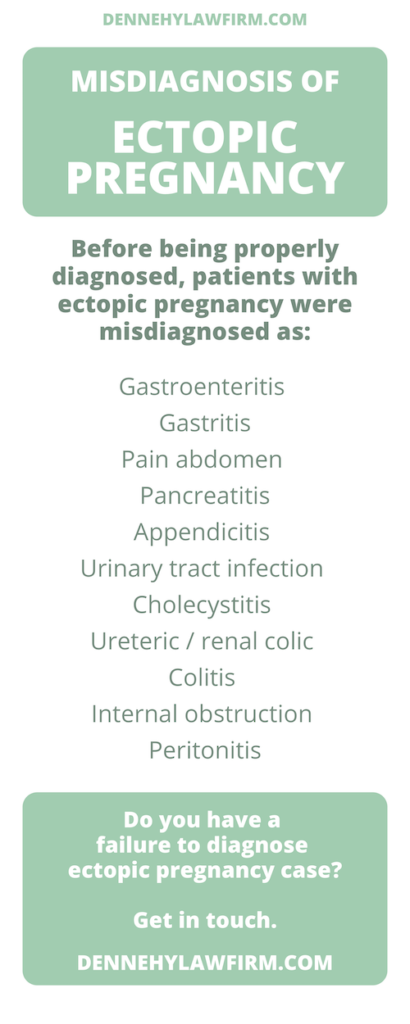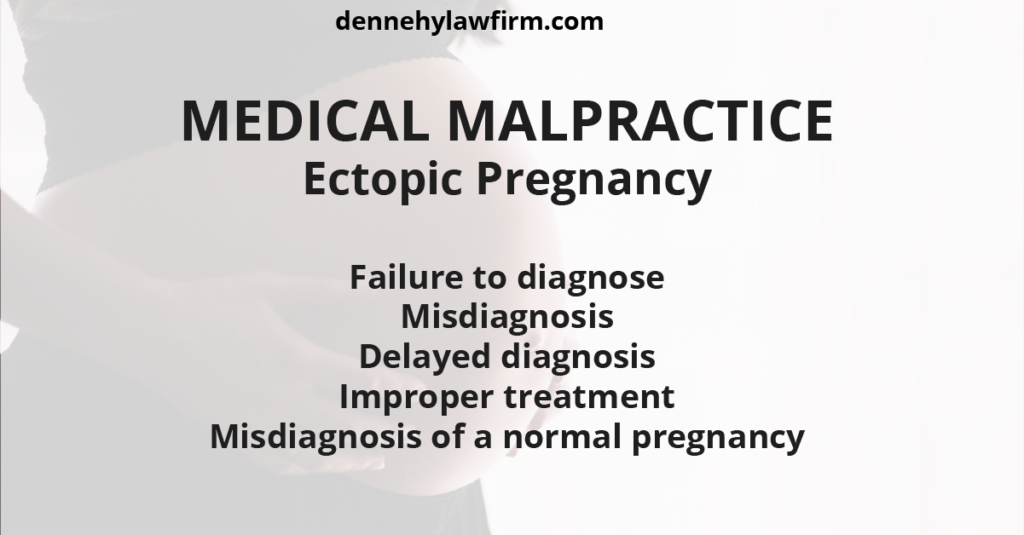Medical negligence relating to ectopic pregnancy is common in the realm of medical malpractice and failure to diagnose ectopic pregnancy is one of the most common forms of medical negligence.
Some ways medical negligence occurs are:
- Failure to diagnose leading to rupture and surgery
- Misdiagnosis leading to delayed diagnosis
- Improper treatment
- Misdiagnosis of a normal pregnancy as ectopic pregnancy leading to loss of fetus, fertility etc
Note that the below list is not exhaustive, there may be other forms of medical negligence in ectopic pregnancy cases.
Table of Contents
Medical malpractice ectopic pregnancy settlement
How much can you win in a medical malpractice ectopic pregnancy settlement?
At Dennehy Law Firm, we have taken on and won misdiagnosis of ectopic pregnancy cases (or failure to diagnose). Most recently, we won a $600,000 settlement based on the testimony of an obstetrician.
In the following article, we will get into what constitutes an ectopic pregnancy and ways it may be misdiagnosed or left untreated, resulting in medical negligence.
What is an Ectopic Pregnancy?
An ectopic pregnancy is a female reproductive system complication wherein a fertilized egg implants outside of the uterus in the fallopian tubes, ovaries or cervix.
Ectopic pregnancies usually don’t go full term and are often not viable, but can still be dangerous if the woman in question does not realize she is pregnant.
Women who are diagnosed with an ectopic pregnancy have to have surgery in order to avoid any further complications, including death. Therefore, it is of utmost importance that proper diagnoses are carried out and not delayed. The risk of death is 10x greater than that of an induced abortion.
Similarly, women who are misdiagnosed with this type of pregnancy may be treated incorrectly and lose their baby. Please continue reading for more information on this type of case.
Ectopic pregnancy causes
What causes ectopic pregnancies? While they are fairly rare (1 out of 80-90 pregnancies), certain risk factors may contribute to having one.
High risk factors include:
- Previous ectopic pregnancy – a woman that has had a previous similar pregnancy has a 7%-10% likelihood of having another one
- Previous tubal surgery
- Failed tubal ligation
- Documented tubal damage or pathology
- Failed IUCD
Moderate risk factors include:
- History of infertility
- Previous pelvic, genital infection, or pelvic inflammatory disease, often caused by an STI
- Assisted reproductive technology, such as in-vitro fertilization
Ectopic pregnancy misdiagnosis
Since ectopic pregnancies can present in diverse ways, misdiagnosis is quite common and occurs across gynecology, surgical, emergency and medical departments.
In fact, around 40% of ectopic pregnancies are misdiagnosed, usually as a result of medical staff not following clinical guidelines.
Oftentimes, patients presented with related, but different, complaints and were seen 1-2 times by a doctor before correctly diagnosed.
Misdiagnosis by emergency room and surgery departments may include:
- Appendicitis
- Urinary tract infection (UTI)
- Cholecystitis
- Ureteric or renal colic
- Peritonitis
- Intestinal obstruction
- Colitis
- Pancreatitis
- Gastroenteritis gastritis
In the gynecology department, misdiagnosis is less common, but when it happens it frequently is as:
- Threatened abortion
- Incomplete abortion
- Complete abortion
- Missed abortion
- Appendicitis
- Peritonitis
- Pelvic inflammatory disease
- Urinary tract infection
- Dysfunctional uterine bleeding
- Placenta praevia
Based on the long list above, it’s clear that ectopic pregnancies are not always simple to diagnose and misdiagnosis is quite common if further tests are not carried out.

Normal pregnancy misdiagnosed as ectopic
Can a doctor mistake an ectopic pregnancy? Absolutely.
A woman with a normal pregnancy may be misdiagnosed with an ectopic pregnancy, and the results may be devastating to early pregnancies.
Many people wonder,” is an ectopic pregnancy is considered a loss?” If misdiagnosis and treatment results in damage or loss to the fetus, then yes, it would be considered a loss.
How does misdiagnosis of a normal pregnancy happen? Unfortunately, if similar symptoms to ectopic pregnancies present (spotting, bleeding, abdominal pain) and it is an early pregnancy (less than 6 weeks gestation), misdiagnosis may quite easily occur.
There have been well-documented misdiagnosis cases of women with intrauterine pregnancies that are suspected to have ectopic pregnancy and are then treated with intramuscular methotrexate which then leads to a miscarriage (failure of pregnancy) and even birth defects in the baby, if the methotrexate fails to end the pregnancy.
According to the article, “Diagnostic Criteria for Nonviable Pregnancy Early in the First Trimester” in the New England Journal of Medicine, “Malpractice lawsuits related to this type of error constitute ‘a rapidly increasing source of medical liability actions,’ and there are online support groups for women erroneously treated in this manner.”
Said support groups can be found on Facebook: Misdiagnosed ectopic, given methotrexate.
If you or a loved one with a normal pregnancy was misdiagnosed, please get in touch today for a free consultation.
Failure to diagnose ectopic pregnancy
In cases where a pregnancy is, in fact, ectopic, the main cause for medical negligence is failure to diagnose, delay in diagnosis, misdiagnosis or improper treatment.
As medical staff inquire about symptoms, they should always consider the possibility of ectopic pregnancy and schedule appropriate tests to determine the condition.
If it is not identified and treated quickly, it can eventually lead to a rupture. Though not extremely painful, severe blood loss and sepsis may be a risk. If left unattended, death is also a risk, although it is considered quite rare.
Among the tests to confirm this diagnosis are:
- A transvaginal ultrasound scan
- Blood tests for hCG (Human Chorionic Gonadotropin) pregnancy hormone and any irregularities related to pregnancy
- A pregnancy test
- Performing a laparoscopy (keyhole surgery) to examine the womb and fallopian tubes directly
Proper treatment of ectopic pregnancies
In the case of an ectopic pregnancy prior to rupture, treatment should consist of:
- Medication – methotrexate to prevent further development of embryo
- Expectant management – close monitoring as fertilized egg may naturally recede or dissolve
- Laparoscopy – if necessary, a keyhole surgery can be performed wherein the embryo is removed via a fallopian tube. Though not a major surgery, it is still invasive, requires general anesthesia (and associated risks), is possibly unnecessary and should be treated as a last resort (though it often isn’t).
If rupture occurs, medication and management is no longer sufficient to reduce risk to the patient and more invasive surgery must be carried out.
Do I have an ectopic pregnancy malpractice case?
You may have experienced ectopic pregnancy negligence, which can occur in a number of ways.
If rupture occurs because time was wasted due to misdiagnosis and/or delay in treatment thereby leaving surgery as the only option, you might have a case.
Had the pregnancy been properly diagnosed and treated in a timely manner, a much safer and less invasive treatment could have been applied, such as methotrexate. See above for proper treatment, prior to invasive surgery.
Surgery always comes with its inherent risks and mistakes. It may result in some of the following consequences, such as:
- Scars
- Decreased fertility if a fallopian tube is lost
- The wrong fallopian tube may be removed/lost
- As a result of losing a fallopian tube, the woman may have a much harder time getting pregnant and may require expensive fertility treatments, such as in-vitro fertilization
- Infertility
- Recovery time resulting in job or income loss, when less invasive treatment (methotrexate or laparoscopy) with shorter recovery time may have been possible
Read these articles for more information on the proper diagnosis and management of an ectopic pregnancy and topics in primary care medicine early diagnosis of ectopic pregnancy.
How does medical malpractice lawyer deal with ectopic pregnancy cases?
The first step is to determine whether you have a case at all and, if so, what kind of case. Remember, at Dennehy Law Firm we offer free consultations where this can be determined.
Were you misdiagnosed as ectopic when you had a normal pregnancy, leading to loss? Or did you, in fact, have an ectopic pregnancy that medical staff failed to diagnose and properly treat before you suffered other health consequences.
If we determine that you have a case and if you decide to work with us, we would collect your testimony of events that took place, symptoms, visits to health care providers, witnesses, and test results to determine the proper diagnosis and management that should have taken place and to negotiate a settlement.
Have you or a loved suffered loss and pain due to misdiagnosis of ectopic pregnancy and/or failure of treatment? Were you forced to undergo surgery that was not necessary and potentially leading to negative consequences?
Get in touch today – we can help you obtain compensation for damages that you suffered.

